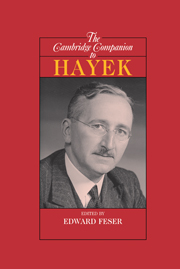Book contents
- Frontmatter
- Introduction
- 1 Hayek and the Austrian tradition
- 2 Hayek on money and the business cycle
- 3 Hayek and market socialism
- 4 Hayek and Marx
- 5 Hayek versus Keynes: the road to reconciliation
- 6 Hayek on knowledge, economics, and society
- 7 Hayek and Popper: the road to serfdom and the open society
- 8 Hayek’s politics
- 9 Hayek the philosopher of law
- 10 Hayek and liberalism
- 11 Hayek and conservatism
- 12 Hayek on the evolution of society and mind
- 13 Hayek on justice and the order of actions
- 14 Hayek the cognitive scientist and philosopher of mind
- Guide to Further reading
- Bibliography
- Index
5 - Hayek versus Keynes: the road to reconciliation
Published online by Cambridge University Press: 28 January 2007
- Frontmatter
- Introduction
- 1 Hayek and the Austrian tradition
- 2 Hayek on money and the business cycle
- 3 Hayek and market socialism
- 4 Hayek and Marx
- 5 Hayek versus Keynes: the road to reconciliation
- 6 Hayek on knowledge, economics, and society
- 7 Hayek and Popper: the road to serfdom and the open society
- 8 Hayek’s politics
- 9 Hayek the philosopher of law
- 10 Hayek and liberalism
- 11 Hayek and conservatism
- 12 Hayek on the evolution of society and mind
- 13 Hayek on justice and the order of actions
- 14 Hayek the cognitive scientist and philosopher of mind
- Guide to Further reading
- Bibliography
- Index
Summary
[Keynes] was one of the great liberals of our time. He saw clearly that in England and the United States during the nineteen-thirties, the road to serfdom lay, not down the path of too much government control, but down the path of too little, and too late . . . He tried to devise the minimum government controls that would allow free enterprise to work. The end of laissez-faire was not necessarily the beginning of communism.
– A. F. W. Plumptre, ‘Keynes in Cambridge’INTRODUCTION
The passage of time reduces the Cambridge debates of the 1930s to family quarrels. On the flattened surface stand the twin peaks of Hayek and Keynes. Their intellectual antipody seems the more palpable, because they rarely found a common ground on which to engage. “Both sides launched their broadsides, and that was about it.” In economics they were so far apart that, except for one inconclusive and bad-tempered theoretical encounter in 1931-32, they worked out their theories independently of each other. In his brief 1944 comment on Hayek's Road to Serfdom, Keynes in effect accused Hayek of lacking a short-period theory of statesmanship; while Hayek accused Keynes (in many writings after Keynes' death) of being blind to the long-term consequences of the “dangerous acts” Keynes sanctioned for a “community which thinks and feels rightly.” But again they did not engage directly, because whereas Hayek wrote systematic treatises on political and social theory, Keynes did not live long enough to answer him in his own coin.
- Type
- Chapter
- Information
- The Cambridge Companion to Hayek , pp. 82 - 110Publisher: Cambridge University PressPrint publication year: 2006
- 16
- Cited by



